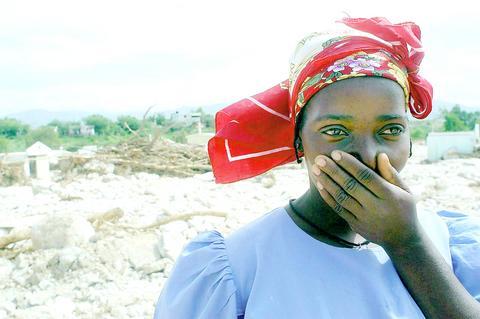An international rescue operation targeting Haiti and the Dominican Republic gathered pace as the death toll from flash floods rose to 918, with hundreds still missing.
The UN and other aid agencies were trying to get water and medical supplies to the worst hit towns, UN officials said. But bad weather held up efforts.
The official toll in the Dominican Republic rose on Thursday to 339 dead and at least 375 missing, mainly in the devastated town of Jimani. The official toll in Haiti rose by eight overnight to 579 dead.

PHOTO: EPA
National Emergency Commission spokesman Jose Luis German said 329 were confirmed dead, 375 missing and 122 injured in Jimani, which was virtually wiped out by the flash floods in the early hours of Monday.
Ten other deaths in the rest of the country have also been blamed on the floods.
German said the toll in the Jimani region would certainly rise as the affected zone was very spread out.
In Haiti, UN relief agencies and non-government groups were trying to fly food, water and medical supplies to the worst-hit towns of Mapou Belle-Anse and Fonds Verette.
But bad weather was holding up helicopter flights.
A Geneva spokeswoman for the UN Office for the Coordination of Humanitarian Affairs said a local UN mission, the Red Cross and the Oxfam charity had flown to Mapou Belle-Anse in the southeast with 1.5 tonnes of water and water purification tablets.
A joint World Food Program and Haitian health ministry team was to go to Fonds Verette, north east of Port-au-Prince, with food supplies, the spokeswoman added.
Two teams of UN disaster experts were to leave for Haiti and the Dominican Republic yesterday to help the relief efforts, the OCHA spokeswoman said.
In Haiti, members of the multi-national force brought in to enforce security after former Haitian president Jean Bertrand Aristide resigned and fled at the end of February were also trying to get emergency supplies to the worst-hit areas.
At least 272 people were reported dead in Mapou Belle-Anse and at least 100 in the Grand Gosier area. Another 165 died in Fonds Verettes.
European Commission chief Romano Prodi wrote to Haiti's interim President Boniface Alexandre, extending his "sympathy and solidarity" for the tragedy his country was going through.
Haiti and the Dominican Republic make up the island of Hispaniola, which was hit by 10 days of torrential rains, turning rivers into raging torrents. Many of the dead were swept away as they slept in their beds.
In Jimani, many of the people buried in mass graves because of public health concerns were women and children, although families could claim a relative's body.
"The problem is that entire families were lost," he said, "so there's no one to claim them."
More than 32,000 residents have moved out of Jimani, 280km west of Santo Domingo, near the border with Haiti. About 210 families lost their homes.
Hundreds of rescuers, firefighters and the Red Cross used backhoes and shovels to remove mud covering homes and streets as they looked for survivors, although hopes dimmed on the fourth day after the floods.
Dominican President Hipolito Mejia and US ambassador Hans Hertell examined the devastation. Mejia declared the town a disaster area and a day of national mourning.
The devastation was such that "even the cemetery was destroyed," German said.
Inhabitants of the two countries have told of miraculous survival tales as the Soleil River turned into a torrent in Jimani on Monday.
Bartolina Diaz, 65, said she clung to an iron door on her house that the waters could not drag away, while Dionisio Mendez, 86, who is blind, was swept 1km downstream before he managed to grab a tree.
The US said it had provided US$50,000, while Canada said it would release US$73,000 in aid to the region.

PARLIAMENT CHAOS: Police forcibly removed Brazilian Deputy Glauber Braga after he called the legislation part of a ‘coup offensive’ and occupied the speaker’s chair Brazil’s lower house of Congress early yesterday approved a bill that could slash former Brazilian president Jair Bolsonaro’s prison sentence for plotting a coup, after efforts by a lawmaker to disrupt the proceedings sparked chaos in parliament. Bolsonaro has been serving a 27-year term since last month after his conviction for a scheme to stop Brazilian President Luiz Inacio Lula da Silva from taking office after the 2022 election. Lawmakers had been discussing a bill that would significantly reduce sentences for several crimes, including attempting a coup d’etat — opening up the prospect that Bolsonaro, 70, could have his sentence cut to

A powerful magnitude 7.6 earthquake shook Japan’s northeast region late on Monday, prompting tsunami warnings and orders for residents to evacuate. A tsunami as high as three metres (10 feet) could hit Japan’s northeastern coast after an earthquake with an estimated magnitude of 7.6 occurred offshore at 11:15 p.m. (1415 GMT), the Japan Meteorological Agency (JMA) said. Tsunami warnings were issued for the prefectures of Hokkaido, Aomori and Iwate, and a tsunami of 40cm had been observed at Aomori’s Mutsu Ogawara and Hokkaido’s Urakawa ports before midnight, JMA said. The epicentre of the quake was 80 km (50 miles) off the coast of

China yesterday held a low-key memorial ceremony for the 1937 Nanjing Massacre, with Chinese President Xi Jinping (習近平) not attending, despite a diplomatic crisis between Beijing and Tokyo over Taiwan. Beijing has raged at Tokyo since Japanese Prime Minister Sanae Takaichi last month said that a hypothetical Chinese attack on Taiwan could trigger a military response from Japan. China and Japan have long sparred over their painful history. China consistently reminds its people of the 1937 Nanjing Massacre, in which it says Japanese troops killed 300,000 people in what was then its capital. A post-World War II Allied tribunal put the death toll

A passerby could hear the cacophony from miles away in the Argentine capital, the unmistakable sound of 2,397 dogs barking — and breaking the unofficial world record for the largest-ever gathering of golden retrievers. Excitement pulsed through Bosques de Palermo, a sprawling park in Buenos Aires, as golden retriever-owners from all over Argentina transformed the park’s grassy expanse into a sea of bright yellow fur. Dog owners of all ages, their clothes covered in dog hair and stained with slobber, plopped down on picnic blankets with their beloved goldens to take in the surreal sight of so many other, exceptionally similar-looking ones.